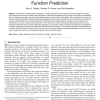Free Online Productivity Tools
i2Speak
i2Symbol
i2OCR
iTex2Img
iWeb2Print
iWeb2Shot
i2Type
iPdf2Split
iPdf2Merge
i2Bopomofo
i2Arabic
i2Style
i2Image
i2PDF
iLatex2Rtf
Sci2ools
118
click to vote
TCBB
2010
2010
On the Importance of Comprehensible Classification Models for Protein Function Prediction
—The literature on protein function prediction is currently dominated by works aimed at maximizing predictive accuracy, ignoring the important issues of validation and interpretation of discovered knowledge, which can lead to new insights and hypotheses that are biologically meaningful and advance the understanding of protein functions by biologists. The overall goal of this paper is to critically evaluate this approach, offering a refreshing new perspective on this issue, focusing not only on predictive accuracy but also on the comprehensibility of the induced protein function prediction models. More specifically, this paper aims to offer two main contributions to the area of protein function prediction. First, it presents the case for discovering comprehensible protein function prediction models from data, discussing in detail the advantages of such models, namely, increasing the confidence of the biologist in the system’s predictions, leading to new insights about the data and t...
Comprehensible Protein Function | Function Prediction Models | Protein Function Prediction | TCBB 2010 |
Related Content
| Added | 30 Jan 2011 |
| Updated | 30 Jan 2011 |
| Type | Journal |
| Year | 2010 |
| Where | TCBB |
| Authors | Alex Alves Freitas, Daniela Wieser, Rolf Apweiler |
Comments (0)

